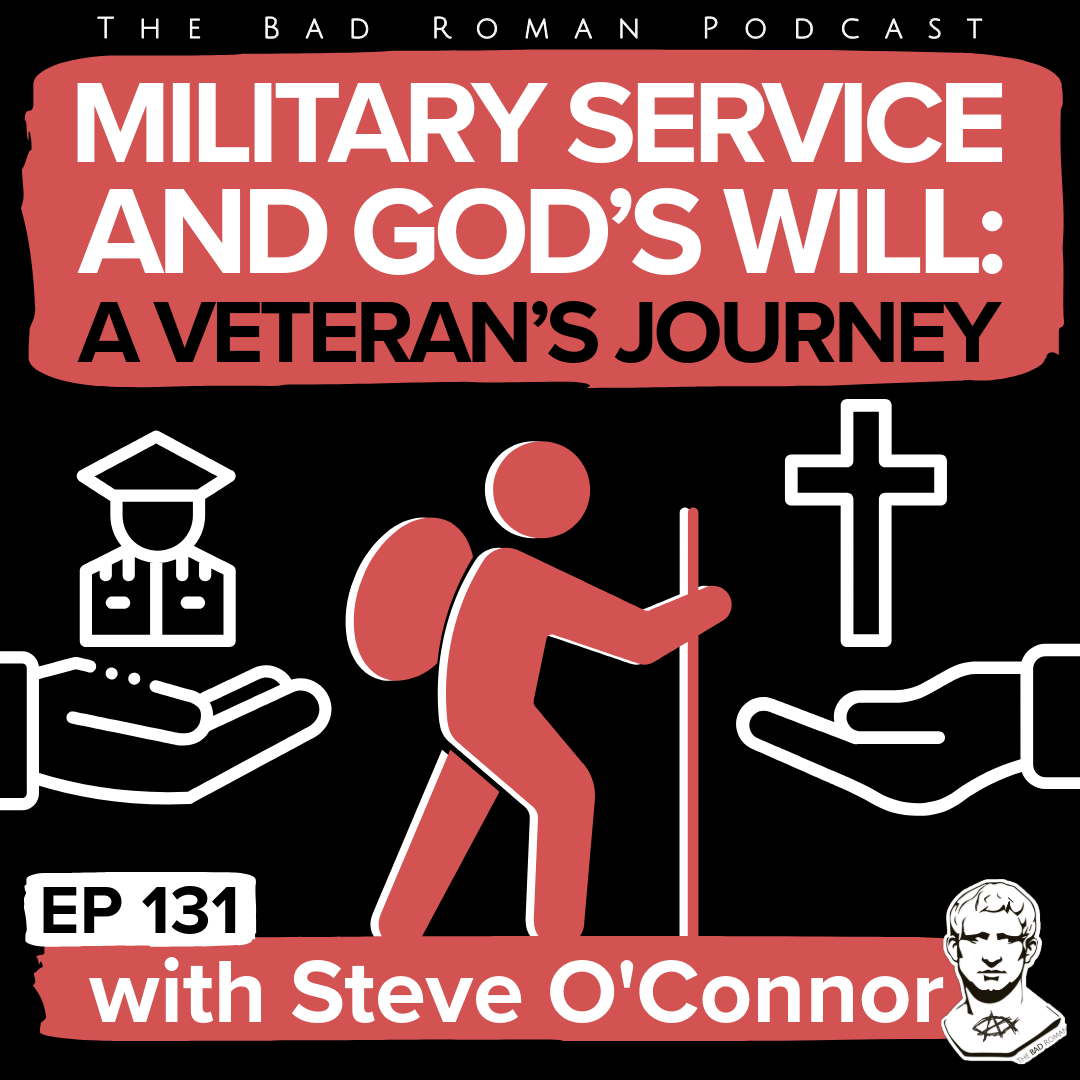About this Episode
Are you tired of feeling like your faith has been watered down by political allegiances and cultural compromises? Do you long for a Christianity that truly embodies the radical teachings of Jesus? In this eye-opening episode of the Bad Roman Podcast, you'll dive deep into the world of Anabaptism with author and researcher Cody Cook. Get ready to challenge your assumptions and rediscover what it truly means to follow Christ in a world that often seems at odds with His teachings.
A Return to Radical Roots
The Anabaptist movement emerged in the 16th century as a response to what many saw as a compromised Christianity. While the Protestant Reformation challenged some aspects of the Catholic Church, the Anabaptists took things further, seeking to return to the radical roots of the early church.
Cody Cook explains:
"The Anabaptists were seen as part of what was called the radical Reformation, which means extreme in common parlance, but it also means basically to go back to the original sources. Basically, to be radical means to go back to the beginning. And I think that's really what they did, more so than Protestants were willing to do."
This commitment to returning to the source—the teachings of Jesus and the early church—set the Anabaptists apart and led to revolutionary ideas that continue to challenge mainstream Christianity today.
Key Insights: What Made the Anabaptists Different?
1. Believers' Baptism
One of the most defining characteristics of Anabaptism was their rejection of infant baptism in favor of baptizing only those who could make a conscious decision to follow Christ. This may seem commonplace now, but at the time, it was revolutionary and threatening to the established order.
As Cook points out:
"Roman Christianity had long assumed the validity of the Volkskirch, that is, that with the exception of heretics and Jews, everyone in Europe belonged to the Church, the people's church, by virtue of infant baptism."
By rejecting infant baptism, Anabaptists were essentially challenging the entire concept of Christendom and the marriage of church and state.
2. Nonviolence and Pacifism
Another core tenet of Anabaptism was a commitment to nonviolence and pacifism. This wasn't just a personal preference, but a deeply held conviction based on their understanding of Jesus' teachings.
Cook explains:
"Jesus not only modeled non-violent love toward his enemies, but he commanded it from his followers as well. And that made them stand out from the Protestants."
This commitment to nonviolence put Anabaptists at odds with both Catholic and Protestant authorities, leading to severe persecution.
3. Separation from the State
Unlike the reformers who sought to create new "Christian" states, Anabaptists believed in a clear separation between the church and worldly powers. They saw themselves as citizens of God's kingdom first and foremost.
"Christ is our king," Cook emphasizes. "So we should expect that there is going to be some conflict from time to time between the kingdom of God and the kings of men. And when that happens, we're always to side with our loyalty to the kingdom of God."
Challenging Your Assumptions: Rethinking Self-Defense and Pacifism
One of the most thought-provoking aspects of our conversation with Cody Cook was his exploration of pacifism and self-defense. Many Christians, especially in America, have a knee-jerk reaction against pacifism, seeing it as weak or impractical. But Cook challenges you to reconsider this view:
"Ultimately, at the root of it is just the Latin word pox, which means peace. And so it's a way of approaching peace, of peacemaking, essentially."
He goes on to explain that pacifism doesn't necessarily mean complete inaction in the face of threat, but rather a commitment to pursuing peaceful solutions and avoiding lethal force.
This perspective forces us to confront some uncomfortable questions:
Have we allowed our cultural values to overshadow the teachings of Jesus when it comes to violence?
Are there creative, nonviolent ways to protect yourself and others that haven’t been fully explored?
How might your witness as a Christian change if you truly embraced a commitment to peacemaking?
Practical Advice: Living Out Anabaptist Principles Today
While you may not be called to join an Anabaptist church, there are valuable lessons you can learn from their approach to faith:
Prioritize the teachings of Jesus: Make a conscious effort to center your faith on the words and actions of Christ, even when they challenge cultural norms.
Seek peaceful solutions: In conflicts, big and small, look for ways to de-escalate and promote reconciliation rather than retaliation.
Question allegiances: Regularly examine whether your political or cultural loyalties are in conflict with your primary allegiance to Christ's kingdom.
Live simply and in community: Consider ways to simplify your life and deepen your connections with other believers.
Be willing to stand apart: Don't be afraid to take countercultural stances when your faith demands it.
What did we Learn About Radical Christianity?
Our conversation with Cody Cook reminds us that following Jesus has always been a radical act. The Anabaptists, despite their flaws and the intense persecution they faced, offer Christians a compelling vision of what it means to take Jesus' teachings seriously.
As you navigate the complex landscape of modern Christianity, perhaps it's time to revisit some of these "radical" ideas. What if you truly embraced nonviolence, even in the face of threats? What if you saw yourself primarily as a citizen of God's kingdom rather than any earthly nation? What if you committed to building voluntary communities of faith rather than relying on state power to enforce your beliefs?
These are challenging questions, but they're worth wrestling with. As Cook's upcoming book The Anarchist Anabaptist suggests, there may be more overlap between these historical believers and modern Christian anarchists than you might think.
Listen to the full episode for a deeper dive into these fascinating topics. And as you do, ask yourself: How might embracing some of these Anabaptist principles transform your walk with Christ?
Connect with Cody Cook:
Podcast - Cantus Firmus
Explore Cody’s Books
Website: www.cantus-firmus.com
Bad Roman Episodes with Cody Cook:
Episode Timestamps:
(1:07) Background on Anabaptists
Connections between Mennonites, Anabaptists, and Amish
Craig's personal experiences with Mennonites
(1:48) Cody's Current Projects
Overview of Cody's work on Anabaptist systematic theology
Introduction to "The Anarchist Anabaptist" book
(3:55) Anabaptist Church Availability
Craig's search for Anabaptist churches in the Memphis area
Challenges of attending distant churches
(5:06) Diversity Within Modern Anabaptism
Spectrum of conservative to liberal Anabaptist groups
Cody's focus on traditional Anabaptist political theology
(9:05) Anabaptists and Anarchism
Separationist vs. activist anarchism
Anabaptists' view of Christ as king and the state as separate
(12:28) Historical Context of Anabaptism
Emergence of Anabaptists in the 16th century, challenging the union of church and state
Anabaptists sought to build a voluntary society, emphasizing freedom of religion and speech
Key Anabaptist beliefs: believers' baptism, nonviolence, separation from the state
(20:40) Pacifism and Self-Defense in Christian thought
Discussion on Christian pacifism vs. self-defense
Jesus teaches followers to set aside their rights rather than assert them
Exploration of natural rights and Christian obligations
Importance of thinking through responses to hypothetical situations is emphasized
Pacifism as working towards peace, not necessarily absolute non-resistance
(29:28) American Revolution and Christianity
Review of David Bercot's book "In God We Don't Trust"
Critique of justifications for the American Revolution
At the time of the American Revolution, colonists were taxed at about 1.5%
Americans received benefits of British citizenship without many downsides
This is contrasted with modern taxation rates of 30-50%
(47:49) State Ordination and Biblical Perspective
Complexities of God's ordination of the state
Satan's and human influence on state power
(52:55) Democracy vs monarchy debate
Reference to a previous episode discussing monarchy versus democracy
Suggestion that the U.S. is no longer a republic but has moved into democracy
Questioning whether people are better off under current system compared to past
(54:24) Cody's book recommendations and future projects
Cody mentions his book "Fight the Powers" about political and demonic power
He has a short book on Christian nationalism from an Anabaptist perspective
Cody will be taking over some hosting duties for the Libertarian Christian podcast









































